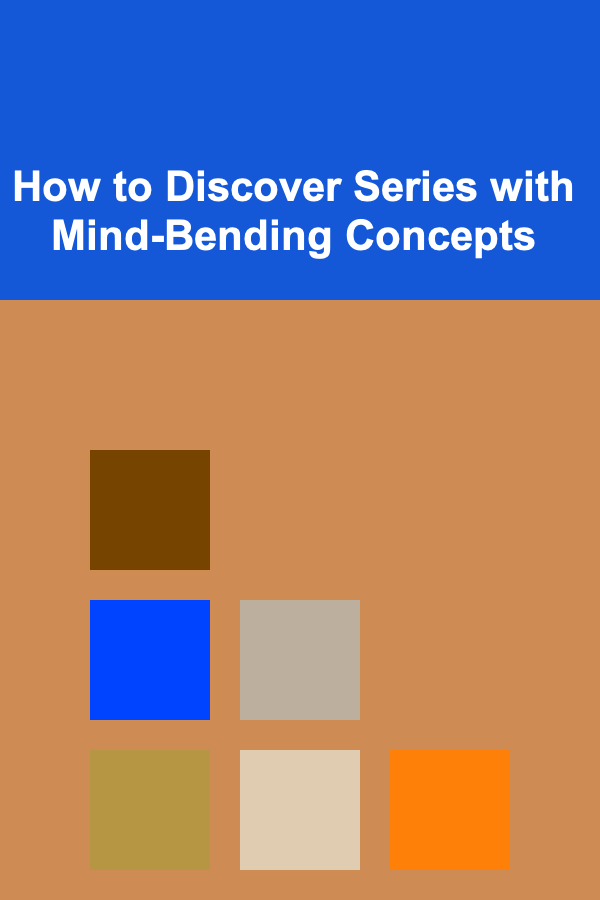
How to Discover Series with Mind-Bending Concepts
ebook include PDF & Audio bundle (Micro Guide)
$12.99$7.99
Limited Time Offer! Order within the next:

In a world filled with constant change, innovation, and the pursuit of knowledge, one of the most exhilarating journeys is the exploration of mind-bending concepts. These concepts not only push the boundaries of our understanding but also inspire us to think differently about the world around us. They challenge our perceptions, invite us to question the status quo, and open our minds to new possibilities.
In this article, we will delve into how you can discover, understand, and appreciate series with mind-bending concepts, from the realms of science and philosophy to literature and beyond. Understanding these concepts requires a mix of curiosity, patience, and a willingness to embrace the unknown. Whether you are an academic, a casual learner, or someone simply seeking to expand their intellectual horizons, the world of mind-bending ideas is an exciting place to explore.
The Nature of Mind-Bending Concepts
Before we dive into specific series and how to discover them, it's crucial to define what "mind-bending concepts" actually are. These are ideas that challenge our conventional understanding of reality, existence, and the universe. They push the limits of logic, often presenting paradoxes or introducing entirely new frameworks for understanding the world.
In many cases, mind-bending concepts don't have easy answers. They provoke deeper inquiry and spark the imagination, often leading to more questions than answers. For example, in physics, the concept of quantum entanglement challenges our classical understanding of space and time. In philosophy, questions about the nature of consciousness or the existence of free will force us to confront the limits of human understanding. These concepts, though difficult to grasp, often form the foundation of groundbreaking discoveries in both science and art.
Discovering Mind-Bending Concepts in Science
Science has long been a domain where mind-bending concepts are uncovered, particularly in fields such as physics, astronomy, and biology. Let's look at some of the most mind-bending ideas in science and how you can start discovering them.
Quantum Mechanics: The Nature of Reality
Quantum mechanics is one of the most famous and perplexing areas of modern physics. At the heart of quantum mechanics lies the concept that particles, such as electrons, exist in multiple states at once, a phenomenon known as superposition. This idea is encapsulated in Schrödinger's famous thought experiment involving a cat that is both alive and dead until observed.
Quantum entanglement, another mind-bending aspect of quantum mechanics, suggests that two particles can be connected in such a way that the state of one particle instantly influences the state of the other, regardless of the distance separating them. This seems to violate the principles of locality and causality, and scientists still struggle to fully understand the implications of these findings.
To discover more about quantum mechanics, you can start by exploring books and documentaries that explain its principles in accessible language. Key resources include:
- The Quantum Universe by Brian Cox and Jeff Forshaw
- Quantum Mechanics: The Theoretical Minimum by Leonard Susskind and Art Friedman
- Documentaries such as The Fabric of the Cosmos hosted by Brian Greene
The Theory of Relativity: Space and Time
Albert Einstein's theory of relativity revolutionized our understanding of space and time. It proposed that space and time are not fixed entities but are instead interwoven into a single four-dimensional fabric known as spacetime. According to relativity, massive objects can warp spacetime, which causes the phenomenon of gravity.
Perhaps the most mind-bending idea associated with relativity is the concept of time dilation. As an object approaches the speed of light, time slows down for that object relative to others. This means that astronauts traveling at high speeds in space would age more slowly than people remaining on Earth.
To dive deeper into relativity, consider reading:
- A Brief History of Time by Stephen Hawking
- The Elegant Universe by Brian Greene
- Theoretical physics courses available online through platforms like Coursera or edX
The Multiverse: Infinite Realities
The concept of the multiverse suggests that our universe is just one of many, each with its own set of physical laws and realities. This idea arises from various theories in physics, including string theory and the cosmological inflation theory. Some versions of the multiverse propose that there could be infinite versions of ourselves, each living in a slightly different reality.
The multiverse theory is still speculative, but it offers a mind-bending way of thinking about the universe and our place within it. To explore the multiverse further, you might want to look into works such as:
- The Hidden Reality: Parallel Universes and the Deep Laws of the Cosmos by Brian Greene
- Articles and videos by physicists such as Max Tegmark, who explore the mathematical foundations of the multiverse
Discovering Mind-Bending Concepts in Philosophy
While science often focuses on the empirical and observable, philosophy delves into the abstract and speculative. Many of the most mind-bending concepts come from philosophical thought experiments and paradoxes, which encourage us to question our assumptions about reality, consciousness, and existence.
The Ship of Theseus: Identity and Change
One of the most famous philosophical paradoxes is the Ship of Theseus. Imagine a ship that, over time, has every part replaced with a new, identical part. If all the parts are replaced, is it still the same ship? And if the original parts are reassembled into a new ship, which one is the real Ship of Theseus?
This paradox invites deep questions about identity, change, and continuity. What makes an object or a person "the same" over time? Is it the physical components, or is it something more abstract, like memory or function?
To dive deeper into philosophical concepts like this, look into:
- The Problems of Philosophy by Bertrand Russell
- Meditations by Marcus Aurelius
- Works by modern philosophers like Daniel Dennett and David Chalmers, who explore topics of consciousness and personal identity
The Trolley Problem: Ethics and Decision-Making
Another mind-bending philosophical concept is the trolley problem, a thought experiment in ethics. In its most basic form, the problem presents a scenario where a trolley is headed towards five people tied to a track. You can pull a lever to divert the trolley to another track, but this will kill one person who is tied to that track. The dilemma challenges the concepts of utilitarianism (maximizing overall good) and deontological ethics (following rules or duties).
The trolley problem forces us to confront difficult ethical questions about the value of individual lives, the role of intention in moral decisions, and the nature of moral responsibility.
To explore ethical thought experiments and moral philosophy, consider reading:
- Utilitarianism by John Stuart Mill
- Ethics: Inventing Right and Wrong by J.L. Mackie
- The Moral Landscape by Sam Harris
Discovering Mind-Bending Concepts in Literature
Literature offers another rich source of mind-bending concepts, particularly in the genres of science fiction, fantasy, and existential literature. These works often explore ideas about the nature of reality, consciousness, and human existence in ways that challenge our perception of the world.
The Metaphysical Exploration of Reality
In works such as The Metamorphosis by Franz Kafka, the protagonist, Gregor Samsa, wakes up one day to find himself transformed into a giant insect. This surreal transformation raises questions about identity, alienation, and the relationship between mind and body. Kafka's work forces readers to confront the often disorienting and absurd nature of human existence.
Similarly, Jorge Luis Borges's short stories, such as The Library of Babel, explore the infinite nature of knowledge and the paradoxes inherent in our attempts to make sense of the universe. Borges's work often blurs the boundaries between fiction and reality, leaving readers questioning the very nature of existence.
Exploring the Concept of Consciousness
Works like Do Androids Dream of Electric Sheep? by Philip K. Dick, which inspired the film Blade Runner, raise profound questions about consciousness and what it means to be human. The novel explores the ethics of artificial intelligence and the nature of reality in a world where human-like androids are indistinguishable from humans.
For a deeper exploration of consciousness in literature, you might read:
- The Unbearable Lightness of Being by Milan Kundera
- Neuromancer by William Gibson
- The Man Who Fell to Earth by Walter Tevis
The Power of Imagination: Why Mind-Bending Concepts Matter
Why do we seek out mind-bending concepts in the first place? The answer lies in the power of imagination and the human desire for understanding. These concepts challenge our assumptions about the world, forcing us to reconsider what we know about reality, time, space, and even ourselves. By embracing these ideas, we push the limits of human knowledge and continue to evolve as thinkers and creators.
Mind-bending concepts also inspire creativity. Whether you are a scientist, philosopher, writer, or artist, exploring these ideas can lead to new breakthroughs, inventions, and works of art that change the way we perceive the world. They encourage us to dream beyond the present moment and imagine a future that is both strange and exciting.
Conclusion
Discovering series with mind-bending concepts is a journey that requires an open mind, curiosity, and a willingness to explore the unknown. From quantum mechanics and the theory of relativity in science to the philosophical questions of identity and ethics, there is no shortage of ideas that challenge our understanding of the world. By engaging with these concepts, we not only expand our knowledge but also deepen our appreciation for the mysteries of existence. Whether through books, discussions, or personal reflection, the exploration of mind-bending concepts is one of the most rewarding intellectual pursuits available to us.

How to Choose Affordable Art That Elevates Your Decor
Read More
How to Create a DIY Photo Booth for Fun Memories
Read More
How to Create a Quick and Easy Updo
Read More
The Social Worker's Guide: Navigating Challenges and Empowering Communities
Read More
The Ultimate Guide to Achieving Glass Skin: A Comprehensive Approach
Read More
How to Leverage Affiliate Marketing for Income: A Comprehensive Guide
Read MoreOther Products

How to Choose Affordable Art That Elevates Your Decor
Read More
How to Create a DIY Photo Booth for Fun Memories
Read More
How to Create a Quick and Easy Updo
Read More
The Social Worker's Guide: Navigating Challenges and Empowering Communities
Read More
The Ultimate Guide to Achieving Glass Skin: A Comprehensive Approach
Read More